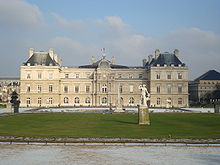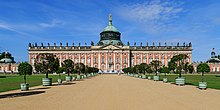palace

A palace is a palace -like and representative magnificent building built in a city. The term “palace” can be found in almost all European languages ( Spanish palacio , Italian palazzo , French palais , English palace ) and can largely be equated with the word city palace ; he describes a residential and representative building as a residence ( government or residence). The description as "palace" is common for architectural epochs such as the Renaissance, or regional styles and regions of the world, such as the Islamic area.
Origin of the term
The word "palace" comes from the name of one of the seven hills in ancient Rome , the Palatine . It is not entirely clear where the name of the hill Palatine itself comes from, but it could be derived from the ancient Italian field deity Pales . In the time of the republic from the end of the 2nd century BC The hill became the preferred residential area of the city. Since Augustus , some Roman emperors have resided there, and since then the name of the hill has been used synonymously for magnificent residential buildings and adopted in various languages.
Use of the term in European culture

The terms castle and palace often overlap, the German terms and their translations are used only slightly differently in different languages. As a rule, they denote magnificent secular buildings . The term "palace" can still be found today in various forms and languages: In the Middle Ages, the Palas was the residential building of a castle , the medieval Palatinate was a representative settlement of the king or emperor , administered by the Count Palatine (the Paladin ) and administered by the ruler and the the traveling courtyard is temporarily inhabited. These buildings are often used for gatherings, for receiving and entertaining guests. This gives the word palace the literal meaning and function of “dining room”, which corresponds to the meaning of the Latin palatium in the monasteries .
Already from the Gothic period in Italy, at the latest from the Renaissance , a "palazzo" referred to a monumental, unpaved residential building of the secular or ecclesiastical builder, but in contrast to the villa, it was located in the city and in contrast to a residential palace, here called "Reggia" or to the castle, which is called "Castello" here. In the cities themselves numerous splendid buildings by noble and middle-class clients were built; like the Palazzo Pitti and the Palazzo Strozzi in Florence or the Palazzo Spada, later redesigned in Baroque style, in Rome . States and duchies in Italy had a government palace, the “Palazzo Ducale”, in their respective royal seat, of which the Doge's Palace in Venice is the best known.

In France, like in Italy, the name “Palais” is often - but not always - used for castles in larger cities, e. B. the Palais du Luxembourg or the Palais du Louvre in Paris are used, while castles in the country (or formerly rural areas) are more often referred to as château . The city palace is often equated with the " Hôtel particulier ", which is inhabited by the "ordinary" nobility and high officials, while the palaces were usually inhabited by members of the royal family.
In German-speaking areas, castles with the designation “Palais” can also be found during the Baroque period , due to the French language preferred at the European royal courts. B. in Vienna the Palais Schwarzenberg , in Munich the Palais Holnstein or in Potsdam the royal-imperial residences Marmorpalais and Neues Palais .
In Russia, too, the term palace was used for the large residences, such as the Winter Palace in Saint Petersburg and the summer palaces of the Tsars in Peterhof and Tsarskoe Selo .
In England the word “Palace” roughly corresponds to the German “Castle” and does not differentiate at all according to the location - Buckingham Palace is in the middle of London, Blenheim Palace in the country - but mostly means a residential building from the late Renaissance to the 19th century Century. For castles and castles that have emerged from them, the term "castle" is chosen.
A palace surrounded by fortifications is called a palazzo in fortezza .
Palaces in the non-European cultural area
The term palace is also used for the residences of pre- and non-European cultures, such as Egypt , Mesopotamia or China , the German word “castle” has not established itself in our linguistic usage for these buildings. Even in the oldest civilizations, the ruling classes had elaborate houses built to express the social status and power of the residents. As examples, buildings as diverse as the Palace of the Winds in India , the Imperial Palace of Tokyo in Japan or the ruins of the Mayan palaces can be named.
Modern usage of the term
Since the French Revolution , representative public buildings have also been referred to as palaces, such as the Palaces of Justice , in post-revolutionary Russia the “Palaces of Culture” and “Palaces of Pioneers”, in Berlin the Pioneer Palace and the Palace of the Republic . The building of the World's Fair of 1851, the Crystal Palace in London, had a major influence on the iron and glass architecture of the second half of the 19th century. Not only in Las Vegas , hotels and entertainment complexes are very often called “Palace”. The most monumental palace in the world is the Romanian Parliament Palace , which with a volume of over two and a half million cubic meters and 7,000 rooms is the second largest building in the world and its construction cost over 2 billion dollars. The Presidential Palace (Ankara) was built from 2011 to 2014.
See also
- Chinese imperial palaces
- Hôtel particulier in Paris
- Kraton (palace)
- Königspfalz
- List of palaces of crowned heads at the state level
- Palacio
- Hall
- Saray
- Palazzo in fortezza for a palace in a fortress
swell
- ↑ Palace . In: Meyers Konversations-Lexikon . 4th edition. Volume 12, Verlag des Bibliographisches Institut, Leipzig / Vienna 1885–1892, p. 618.

